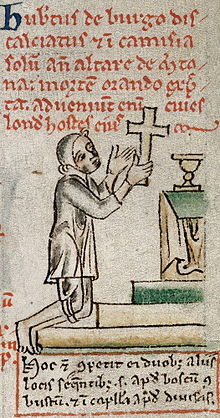Hubert de Burgh, Earl of Kent | |
|---|---|
 Hubert de Burgh seeking sanctuary in 1234, by Matthew Paris, from his Historia Anglorum | |
| Regent of England | |
| In office 1219–1227 | |
| Monarch | Henry III |
| Preceded by | William Marshal, 1st Earl of Pembroke |
| Chief Justiciar of England | |
| In office 1215–1232 | |
| Monarchs | John Henry III |
| Preceded by | Peter des Roches |
| Succeeded by | Stephen de Segrave |
| Justiciar of Ireland | |
| In office 16 June 1232 – August 1232 | |
| Preceded by | Richard Mór de Burgh, 1st Baron of Connaught |
| Succeeded by | Maurice FitzGerald, 2nd Lord of Offaly |
| Lord Warden of the Cinque Ports | |
| In office 1215–1220 | |
| Preceded by | William Brewer |
| Succeeded by | Henry of Braybrooke |
| Seneschal of Poitou | |
| In office 1212–1215 | |
| Preceded by | Robert of Thornham |
| Succeeded by | Geoffrey de Neville |
| Personal details | |
| Born | c. 1170 |
| Died | before 5 May 1243 Banstead, England |
| Spouses | |
| Relations |
|
| Children |
|
Hubert de Burgh, Earl of Kent (English: /dəˈbɜːr/ də-BUR, French: [dəbuʁ]; c. 1170 – before 5 May 1243) was an English nobleman who served as Chief Justiciar of England (1215–1232) and Justiciar of Ireland (1232) during the reigns of King John and his son and successor King Henry III and, as Regent of England (1219–1227) during Henry's minority, was one of the most influential and powerful men in English politics in the thirteenth century.